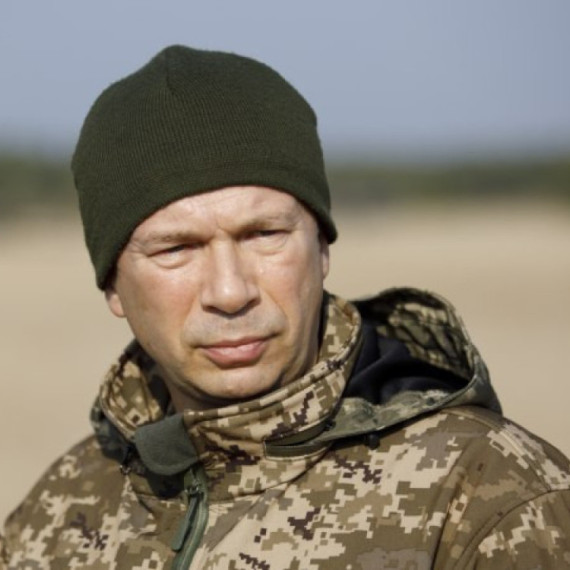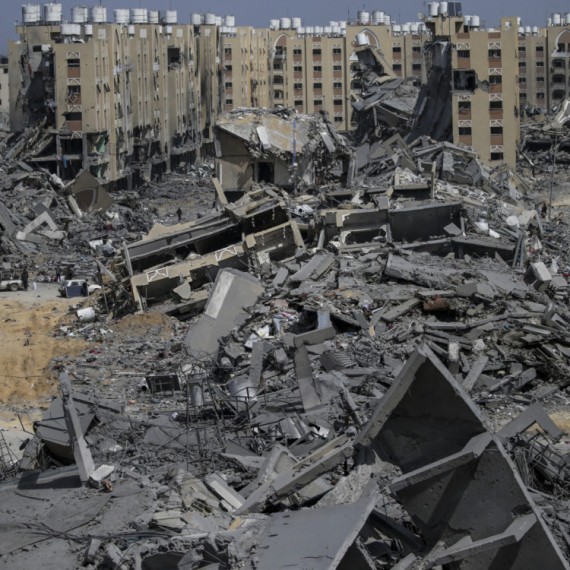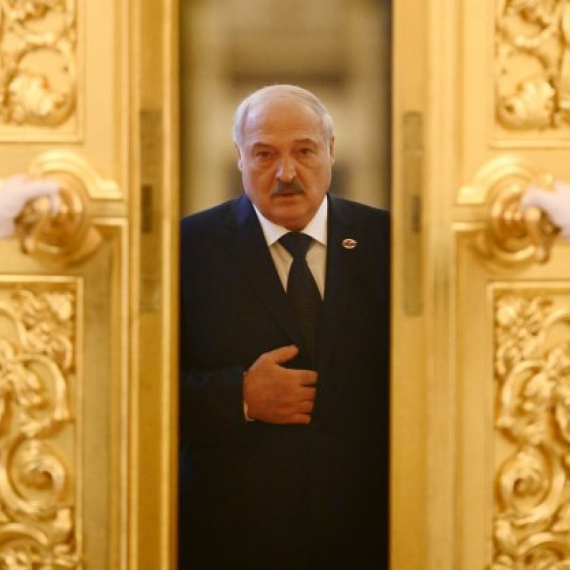Delić defense: Victim to blame for own death
The trial of Rasim Delić, a former Bosnian Muslim army (BH Army) commander, has entered its final stage at the Hague Tribunal.
Thursday, 12.06.2008.
13:23

The trial of Rasim Delic, a former Bosnian Muslim army (BH Army) commander, has entered its final stage at the Hague Tribunal. The prosecution told the court as it presented its closing arguments this week that "evidence has shown beyond reasonable doubt that members of the El Mujahid Detachment were responsible for the crimes in the village of Bikosi in June 1993, and for the killings in the village of Livade and the Kamenica camp in July and September 1995". Delic defense: Victim to blame for own death The former commander of the BH Army General Staff knew of these crimes yet he failed to do anything to prevent the Mujahideen, who were part of the BH Army chain of command, and punish them, the prosecution continued. Documents and testimonies were quoted the prosecution said prove the El Mujahid Detachment members executed twenty five Croat civilians and Croat Council of Defense (HVO) prisoners of war in the village of Bikosi near Travnik on June 8, 1993. General Delic was told about the crime and it was his duty to punish the perpetrators who were part of the BH Army chain of command, as the prosecution alleges. The Mujahideen were "a small unit and could not fight without coordination with others – the El Mujahid Detachment was either de facto subordinated to the BH Army 3rd Corps or de facto its part". The prosecution closing arguments were a rebuttal of paragraphs in the defense final brief, rejecting all the allegations made by Delic's defense counsel. Defense counsel Vasvija Vidovic contended that there was no evidence to prove who killed the victims in the Kamenica camp in July 1995 and how it was done. In its final brief the defense went on to say that "one of the prisoners of war is responsible for his own death because in agony he swore in the presence of an armed man". In the words of the prosecutor, this allegation was "without any merit". The Trial Chamber was showed post mortem reports for the remains of two Bosnian Serb Army (VRS) soldiers, Predrag Knezevic and Momir Mitrovic. As alleged by the prosecution, they were captured by the Mujahideen and then taken to the village of Livade. The reports confirm the identity of the victims, how they died and where they were killed. According to prosecution witnesses, both men were decapitated. "Blood was spurting out of the heads," the witnesses said, and their limbs were tied with green rope and wire. As the prosecutor put it, the way they died points to the conclusion that the members of the El Mujahideen Detachment were responsible. The unit was comprised mostly of residents of Arab and other Muslim Asian and north African countries. Prosecution said that evidence beyond reasonable doubt showed that the El Mujahid Detachment members were responsible for the fate of some sixty VRS soldiers who were taken to the Kamenica camp together with three women after the fall of Vozuca on September 11, 1995. They went missing afterwards, and are presumed dead. The BH Army, the prosecution clarified, had effective control over the El Mujahid Detachment. Contrary to the defense claims, the detachment was not "horizontally linked" with the 3rd Corp but was subordinated to it. The El Mujahid Detachment operated constantly within the area of responsibility of the BH Army and the Mujahideen, the prosecution claims, and always sought permission from the BH Army before launching its attacks. Also, the BH Army trained the Mujahideen in its camps. Although there is no paper trail for the meetings between the members of the El Mujahid Detachment and the 3rd Corps command, the prosecutor contends that the arrangements were planned "face to face". The prosecutor corroborated this claim with photographs of participants of the meetings he showed in the courtroom. Quoting from the testimony of Dzemal Vuckovic, a former analyst in the Security Administration of the BH Army, the prosecutor noted that there was a system in place for relaying the information to General Deli who, as he alleged, knew about the operations the El Mujahid Detachment was involved in when he ordered the fighting to start on all front lines. For all this, the Hague prosecution yesterday sought 15 years in prison for Rasim Delic. Delic's defense, meantime, called for his acquittal, and argued that the El Mujahid Detachment "reported to the Islamic Cultural Institute in Milan and to the terrorist organization Al-Qaeda", whereas its relationship with the Bosnian Muslim army was one of "cooperation". "We do not expect an acquittal on the basis of factors that go beyond the framework of this case. The facts speak clearly in favor of it’, defense lawyer Vasvija Vidovic said. The evidence called at the trial, the defense counsel noted, showed that the prosecution case was "unclear, unconvincing and unsubstantiated, based on constructed facts and fabricated orders". Since Delic is charged with failure to prevent and punish the crimes committed by the members of the El Mujahid Detachment in 1993 and 1995, the defense wanted to sever the link that the prosecution alleges existed between the detachment and Delic. The defense counsel contended that the El Mujahid Detachment "cooperated with the BH Arm' but was not under its control and command". "Combat reports were sent to the Islamic Cultural Center in Milan. Sheik Anwar Shaban, who founded and ran the Center, was the real authority in the El Mujahid Detachment. The detachment also sent reports to the terrorist organization Al Qaeda," the defense counsel went on to say, and the organization decided who would go to Bosnia to fight and which unit they would join.
Delić defense: Victim to blame for own death
The former commander of the BH Army General Staff knew of these crimes yet he failed to do anything to prevent the Mujahideen, who were part of the BH Army chain of command, and punish them, the prosecution continued.Documents and testimonies were quoted the prosecution said prove the El Mujahid Detachment members executed twenty five Croat civilians and Croat Council of Defense (HVO) prisoners of war in the village of Bikosi near Travnik on June 8, 1993.
General Delić was told about the crime and it was his duty to punish the perpetrators who were part of the BH Army chain of command, as the prosecution alleges.
The Mujahideen were "a small unit and could not fight without coordination with others – the El Mujahid Detachment was either de facto subordinated to the BH Army 3rd Corps or de facto its part".
The prosecution closing arguments were a rebuttal of paragraphs in the defense final brief, rejecting all the allegations made by Delić's defense counsel.
Defense counsel Vasvija Vidović contended that there was no evidence to prove who killed the victims in the Kamenica camp in July 1995 and how it was done. In its final brief the defense went on to say that "one of the prisoners of war is responsible for his own death because in agony he swore in the presence of an armed man".
In the words of the prosecutor, this allegation was "without any merit".
The Trial Chamber was showed post mortem reports for the remains of two Bosnian Serb Army (VRS) soldiers, Predrag Knežević and Momir Mitrović. As alleged by the prosecution, they were captured by the Mujahideen and then taken to the village of Livade. The reports confirm the identity of the victims, how they died and where they were killed.
According to prosecution witnesses, both men were decapitated. "Blood was spurting out of the heads," the witnesses said, and their limbs were tied with green rope and wire. As the prosecutor put it, the way they died points to the conclusion that the members of the El Mujahideen Detachment were responsible.
The unit was comprised mostly of residents of Arab and other Muslim Asian and north African countries.
Prosecution said that evidence beyond reasonable doubt showed that the El Mujahid Detachment members were responsible for the fate of some sixty VRS soldiers who were taken to the Kamenica camp together with three women after the fall of Vozuća on September 11, 1995. They went missing afterwards, and are presumed dead.
The BH Army, the prosecution clarified, had effective control over the El Mujahid Detachment. Contrary to the defense claims, the detachment was not "horizontally linked" with the 3rd Corp but was subordinated to it.
The El Mujahid Detachment operated constantly within the area of responsibility of the BH Army and the Mujahideen, the prosecution claims, and always sought permission from the BH Army before launching its attacks. Also, the BH Army trained the Mujahideen in its camps.
Although there is no paper trail for the meetings between the members of the El Mujahid Detachment and the 3rd Corps command, the prosecutor contends that the arrangements were planned "face to face". The prosecutor corroborated this claim with photographs of participants of the meetings he showed in the courtroom.
Quoting from the testimony of Džemal Vučković, a former analyst in the Security Administration of the BH Army, the prosecutor noted that there was a system in place for relaying the information to General Deli who, as he alleged, knew about the operations the El Mujahid Detachment was involved in when he ordered the fighting to start on all front lines.
For all this, the Hague prosecution yesterday sought 15 years in prison for Rasim Delić.
Delić's defense, meantime, called for his acquittal, and argued that the El Mujahid Detachment "reported to the Islamic Cultural Institute in Milan and to the terrorist organization Al-Qaeda", whereas its relationship with the Bosnian Muslim army was one of "cooperation".
"We do not expect an acquittal on the basis of factors that go beyond the framework of this case. The facts speak clearly in favor of it’, defense lawyer Vasvija Vidović said.
The evidence called at the trial, the defense counsel noted, showed that the prosecution case was "unclear, unconvincing and unsubstantiated, based on constructed facts and fabricated orders".
Since Delić is charged with failure to prevent and punish the crimes committed by the members of the El Mujahid Detachment in 1993 and 1995, the defense wanted to sever the link that the prosecution alleges existed between the detachment and Delić.
The defense counsel contended that the El Mujahid Detachment "cooperated with the BH Arm' but was not under its control and command".
"Combat reports were sent to the Islamic Cultural Center in Milan. Sheik Anwar Shaban, who founded and ran the Center, was the real authority in the El Mujahid Detachment. The detachment also sent reports to the terrorist organization Al Qaeda," the defense counsel went on to say, and the organization decided who would go to Bosnia to fight and which unit they would join.





















































Komentari 0